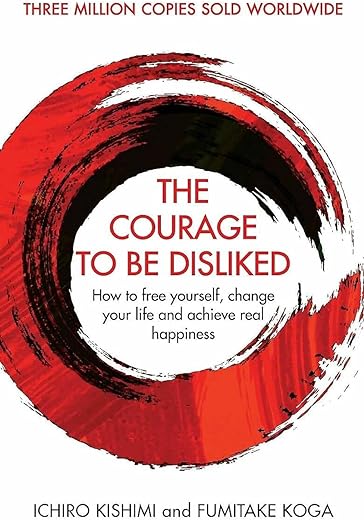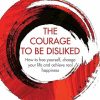The Courage To Be Disliked: How to free yourself, change your life and achieve real happiness (Courage To series)
£9.89£18.99 (-48%)
The Japanese phenomenon that teaches us the simple yet profound lessons required to liberate our real selves and find lasting happiness.
The Courage to be Disliked shows you how to unlock the power within yourself to become your best and truest self, change your future and find lasting happiness. Using the theories of Alfred Adler, one of the three giants of 19th century psychology alongside Freud and Jung, the authors explain how we are all free to determine our own future free of the shackles of past experiences, doubts and the expectations of others. It’s a philosophy that’s profoundly liberating, allowing us to develop the courage to change, and to ignore the limitations that we and those around us can place on ourselves.
The result is a book that is both highly accessible and profound in its importance. Millions have already read and benefited from its wisdom. Now that The Courage to be Disliked has been published for the first time in English, so can you.
Read more
Additional information
| Publisher | Allen & Unwin, Main edition (3 Jan. 2019) |
|---|---|
| Language | English |
| Paperback | 288 pages |
| ISBN-10 | 176063073X |
| ISBN-13 | 978-1760630737 |
| Dimensions | 12.9 x 1.83 x 19.8 cm |












by Sean
What great book on learning lessons from an old man and a youth’s perception to life in general.
I loved this book and would recommend it to any youngsters as they venture out into the big wide world.
I certainly leart a lot and I know that I will be referring back to this book soon. Best wishes Sean
by Divya Sharma
With any book I read, even if there is a 1 thing I can take away I consider it a book worth reading. A lot of the philosophy explored I am familiar with indian philosophy (makes sense as a lot of it is influenced by buddhism which originated in India). However the lens that all problems are due to interpersonal relationships is certainly something new to me. An intriguing and complex idea which at first seems outrageous. An easy read in the form of a dialogue between a philosopher and student.
by X mode
Very crucial for understanding how to manage your Mind And grow as a person. I strongly recommend for people who are anxious, scared I’m fearful of others.
by Very warm
I love the book, glad to finally own a hard copy of it from digital.
by Dominic Simon
Cannot get past the awful, conversation style dialogue that is essentially the entire book. It makes the book hard to follow – not least because the dialogue is cliché and unrealistic. The “youth” in particular has an insufferable attitude. I expect his attitude may change further on in the book, but after one chapter, I cannot tolerate another page of this book. I am very disappointed, especially because the concept is one that I was keen to explore further.
by CloselyObservedEnglish
First, an admission: I bought this book as a joke, not seriously intending to read it. ‘The Courage to be Disliked’? Crazy. But then I actually started reading it, and within pages I was hooked.
Like almost everyone I can think of, I am familiar with the name Sigmund Freud, and of his impact on the world of psychiatry and psychology. His theory that all present problems can be traced back to a root cause is compelling and clearly understandable.
But most importantly, it might very well be wrong.
In this fascinating book, Kishimi introduces the reader to the work and philosophy of Freud’s contemporary, Alfred Adler. He turned Freud’s logic on its head, suggesting instead that we use our current state as an excuse not to change. For example, somebody who is depressed might say that they are depressed as a result of a failed marriage, or that they were never loved as children. But this way of looking at things will simply prevent positive change from happening: you cannot change the past, and therefore the future is already written for you. Adler instead said that a depressed person is using their depression as an excuse not to be depressed – or in other words, there are benefits to the depression that outweigh fighting against it.
At first, this sounds quite ridiculous, not to mention downright insensitive. But as you probe the argument, you find that it is rather more sensible than it first seemed: a depressed person does not have to take risks, such as trying to go out and find somebody to date. If you try asking somebody out, you can easily be rejected, and that causes pain; but if you say you are too depressed to even attempt change, you are protected against the risk.
The courage spoken of in the title of this book then is not so much that you go out of your way to be disliked, but that you come to an understanding of who’s task it is to do the disliking. You cannot make people like you – you can only live in such a way that being liked or disliked matters little to you and your sense of self.
This was the first time I read the name Adler; I doubt it will be the last. My curiosity has been piqued, and I want to know more, for here I seem to have found an approach to living my life that I can really get onboard with.
by Josh You ARE
So much of the advice given to ‘people pleasers’ does not help. Just like yourself. Don’t worry what THEY say. Only your opinion matters. If these things were already the case the advice would perhaps not be needed.The courage To Be Disliked is a conversation between a philosopher and a cynical youth who struggles with self-acceptance and dislike of the world. The conversation is slow and a bit boring to start with but soon accelerates into a no-holds barred discussion of what it means to be a member of society and what freedom in that society really is. It’s apparently based on the work of Alfred Adler a contemporary of Freud’s but is is NOTHING like Freud’s work. If you are looking for a truly different set of ways to view the world (and become free of other’s opinions) this is it. Freedom, truly is the freedom to be disliked as you will discover. Some of the language takes a bit of getting used too – there are new terms including seeing your fellow man as a ‘comrade’ in life rather than competition and I can’t ever imagine calling anyone Comrade (!). However, the concepts are well worth chewing over and you will have to read the whole thing to get the benefit. I feel I have significantly shifted my views on my place in society as a result of these ideas. One to chew on.